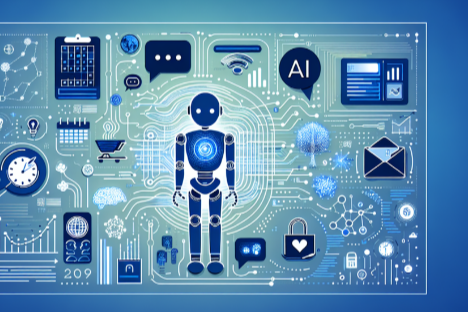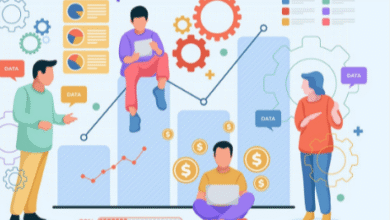Why Businesses Choose Custom AI Agents Over Pre-Built Tools

As artificial intelligence (AI) moves from experimentation into core business strategy, companies are realizing that one-size-fits-all tools rarely deliver long-term impact. Pre-built AI applications can provide quick wins, but their limited adaptability often leaves critical gaps. This is driving a noticeable shift toward custom AI agents, intelligent systems designed to align with a company’s specific workflows, data, and goals.
In fact, Gartner’s Top 10 Data and Analytics Technology Trends report highlighted that by 2024, 75% of companies will move AI out of pilot programs and into full operational use. This surge in adoption underscores the growing need for scalable, adaptable, and business-specific solutions.
Organizations can no longer rely solely on pre-built tools; instead, they are investing in custom agents that integrate deeply with existing systems and deliver measurable business outcomes.
The message is clear: businesses don’t just want AI that’s “good enough”, they need AI that is built for their unique challenges and growth trajectory.
What Are Custom AI Agents?
Custom AI agents are intelligent systems designed and trained specifically for a company’s workflows, data, and objectives. Unlike pre-built AI tools, which provide generic capabilities, custom agents are tailored to solve industry-specific challenges and integrate seamlessly with existing processes.
For instance, a retail business might develop an AI agent that not only assists with customer queries but also accesses inventory data, predicts demand patterns, and automates restocking alerts. This level of personalization goes far beyond what off-the-shelf tools can deliver.
Why Businesses Prefer Custom AI Agents
While pre-built AI tools can offer a starting point, they often lack the depth and flexibility required for long-term success. Custom AI agents stand out because they are designed with a business’s unique data, goals, and workflows in mind, making them more reliable and scalable.
Key reasons businesses are making the shift include:
- Tailored Functionality: Built to match specific processes rather than forcing generic workflows.
- Scalability: Adapts as the business grows and faces new challenges.
- Data Security: Keeps sensitive information within controlled environments.
- Competitive Edge: Creates unique capabilities competitors can’t replicate.
- Higher ROI: Drives measurable improvements in efficiency and decision-making.
Steps to Building Effective Custom AI Agents
Building a custom AI agent requires more than just choosing the right technology; it’s about aligning the system with business goals, data, and long-term scalability. A structured approach ensures that the agent delivers measurable value from day one.
Key steps include:
- Define Clear Objectives: Identify specific business problems the AI agent should solve (e.g., customer support automation, predictive analytics, or operational efficiency).
- Collect and Prepare Quality Data: Ensure the agent is trained on accurate, relevant, and well-structured datasets that reflect real business needs.
- Choose the Right AI Framework or Architecture: Select technologies that allow flexibility, integration, and scalability for future expansion.
- Integrate With Existing Systems: Seamlessly connect the agent to CRM, ERP, or other business platforms for smooth workflows.
- Test, Monitor, and Optimize Continuously: Regularly evaluate performance, gather feedback, and fine-tune the agent to keep it effective as business demands evolve.
Challenges of Using Pre-Built AI Tools
Pre-built AI tools often seem attractive because they are quick to deploy and offer out-of-the-box functionality. However, many organizations find that these tools hit limitations when applied to complex or evolving business needs. Understanding the challenges helps explain why custom AI agents are becoming the preferred choice.
Read also: Kongotech.org: What You Need to Know About This Tech Organization
Key challenges include:
- Limited Adaptability: Generic solutions are not designed for specialized workflows or niche industries.
- Pro Tip: If a pre-built tool doesn’t align with 80% of your processes, it will likely create more workarounds than solutions.
- Integration Barriers: Off-the-shelf AI often struggles to connect smoothly with existing enterprise systems like CRMs or ERPs.
- Pro Tip: Evaluate integration capabilities upfront, hidden costs of custom connectors can quickly add up.
- Restricted Data Control: Many pre-built platforms require sharing sensitive data with third parties, creating compliance and privacy risks.
- Pro Tip: Always check data residency, security certifications, and compliance guarantees before adopting any AI tool.
- Lack of Differentiation: Since competitors may be using the same pre-built solutions, businesses lose the chance to create unique experiences or competitive advantages.
- Pro Tip: If your customers can’t tell the difference between your AI and your competitor’s, it’s time to explore customization.
- Scalability Issues: Pre-packaged tools are often rigid and may not evolve as your business grows or regulations change.
- Pro Tip: Consider future use cases during evaluation, not just what the tool can do today.
How Custom AI Agents Drive Real Business Value
Unlike pre-built tools that offer generic capabilities, custom AI agents are designed with a company’s specific challenges and goals in mind. This makes them powerful drivers of innovation, efficiency, and customer satisfaction across industries.
Key use cases include:
- Healthcare – Custom agents can support patient triage, provide tailored treatment recommendations, and manage appointment scheduling.
- Pro Tip: Build compliance with HIPAA (or equivalent regulations) into the design stage to avoid costly retrofits later.
- Finance – Intelligent fraud detection, real-time risk analysis, and automated compliance reporting ensure secure and efficient operations.
- Pro Tip: Train models on historical fraud cases and regulatory scenarios for better accuracy and trustworthiness.
- Retail & E-Commerce – AI agents can personalize recommendations, optimize pricing, and automate supply chain adjustments.
- Pro Tip: Start with customer-facing personalization before scaling into backend supply chain automation — it delivers visible ROI faster.
- Pro Tip: Start with customer-facing personalization before scaling into backend supply chain automation — it delivers visible ROI faster.
- Manufacturing – Predictive maintenance, quality control, and process optimization reduce downtime and increase efficiency.
- Pro Tip: Use IoT sensors and machine data as input streams to make agents more responsive and proactive.
- Customer Service – Custom AI agents trained on brand-specific language and data can handle complex queries while maintaining brand voice.
- Pro Tip: Blend AI with human-in-the-loop support to strike the right balance between efficiency and empathy.
Final Thoughts
The choice between pre-built AI tools and custom AI agents often comes down to long-term vision. While generic tools may offer speed and convenience, they rarely deliver the adaptability, security, or innovation required for sustained growth. Custom AI agents, on the other hand, are purpose-built to align with a company’s unique workflows, data, and customer expectations, making them far more valuable in driving competitive advantage.
As Gartner’s research shows, AI adoption is moving rapidly from pilots to full operationalization. Businesses that invest in custom AI agents today are positioning themselves not just to keep pace with this shift, but to lead it. By tailoring AI to fit their exact needs, they gain efficiency, unlock new opportunities, and create lasting differentiation in their markets.




